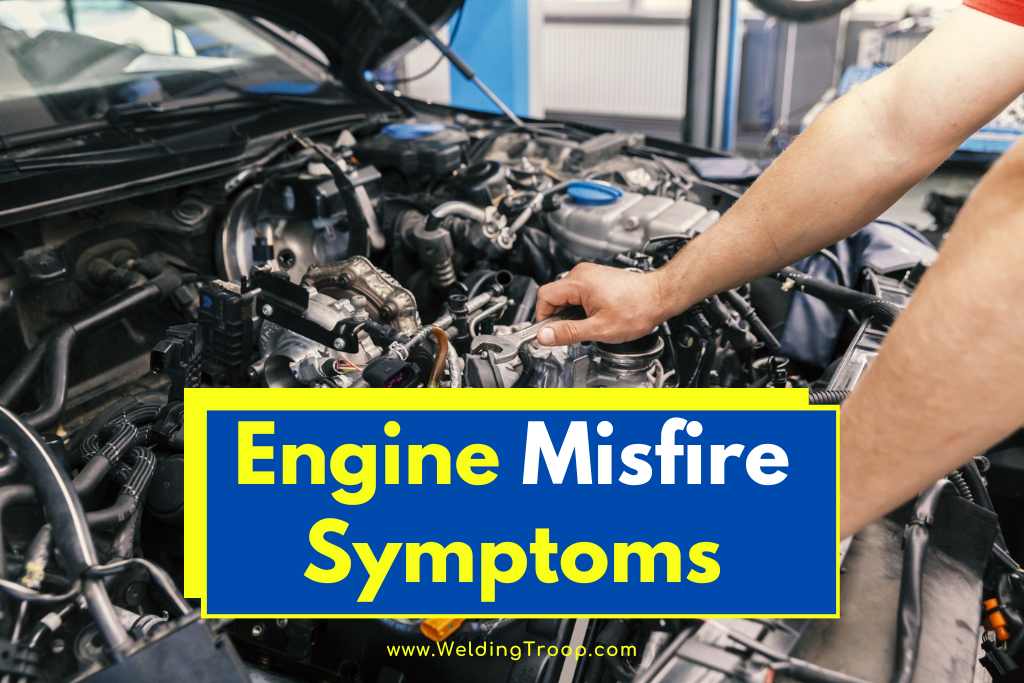Do you know what happens when a car misfires? What are the main causes and symptoms of a misfire?
An engine misfire is a common issue that can lead to a variety of problems, such as reduced fuel efficiency, increased emissions, and even complete engine failure if left unaddressed.
Here are the main symptoms of engine misfire, which includes:
1. Loss of Power, Stumbling, and Vibration
2. Abnormal Sounds
3. Unusual Smells
4. Check Engine Light
5. Struggling Engine
6. Excessive Exhaust Smoke
In this comprehensive guide, we will discuss the various symptoms of engine misfires, their causes, and how to diagnose and fix them. Additionally, we will answer some common questions related to engine misfires.
Table of Contents
What is an Engine Misfire?
An engine misfire occurs when one or more of the engine’s cylinders fail to ignite the air-fuel mixture during the combustion cycle. This incomplete combustion can lead to a variety of engine performance issues, such as reduced power output, increased fuel consumption, and heightened emissions.
Ultimately, if misfires are left untreated, they can cause severe damage to your vehicle’s engine and its associated components.
Common Causes of Engine Misfires
Engine misfires can be attributed to a range of factors, from defective sensors and ignition system problems to air-fuel mixture issues and mechanical malfunctions. Here are some of the most common culprits behind engine misfires:
- Ignition System Problems: Worn-out or damaged spark plugs, ignition coils, or distributor components can compromise your engine’s ignition system, leading to misfires.
- Air and Fuel Delivery Issues: Clogged fuel injectors, malfunctioning fuel pumps, and vacuum leaks can disrupt the optimal air-fuel mixture, causing misfires.
- Emissions Equipment Problems: Faulty oxygen sensors, exhaust gas recirculation (EGR) systems, or positive crankcase ventilation (PCV) systems can alter the engine’s air-fuel mixture, resulting in misfires.
- Engine Mechanical Problems: Internal engine issues, such as damaged pistons or valves, can prevent proper cylinder sealing and lead to a loss of compression, causing misfires.
- Sensor and Module Malfunctions: Defective sensors or engine control modules can disrupt crucial engine functions, such as fuel delivery or spark timing, leading to misfires.
- Control Circuit Issues: Damaged wiring or loose connections in the engine’s electrical circuits can cause misfires due to incorrect information being relayed to the engine management system.
Symptoms of Engine Misfires
Identifying the symptoms of engine misfires can help you take prompt action to address the issue, preventing further damage to your vehicle. Here are some common signs of engine misfires:
Loss of Power, Stumbling, and Vibration
A misfiring engine often leads to a noticeable loss of power, accompanied by vibrations and stumbling. This can be particularly noticeable when accelerating or driving uphill. The engine may also struggle to maintain consistent power, causing it to jerk or shudder.
Abnormal Sounds
A misfiring engine can produce a variety of abnormal sounds, such as popping, sneezing, or backfiring noises. These sounds occur when unburned fuel exits the cylinder during the exhaust stroke and is ignited by the spark of the next cylinder.
Additionally, a change in the overall engine sound, such as a reduction in the typical hum of a four-cylinder engine, may indicate a misfire.
Unusual Smells
Engine misfires can result in unusual smells, such as the odor of gasoline, oil, or coolant. This can be due to damaged cylinder walls allowing fluids to leak into the combustion chamber, or it can be attributed to a melted spark plug wire caused by contact with hot engine components.
Check Engine Light
A flashing or illuminated check engine light is a common indicator of engine misfires. Your vehicle’s onboard diagnostic system monitors the engine’s performance and will trigger the check engine light if it detects a misfire.
Using an OBD2 scanner, you can retrieve the diagnostic trouble codes (DTCs) related to the misfire and use them to help pinpoint the cause.
Struggling Engine
A misfiring engine may struggle to start or stall when idling, especially when the vehicle is under a heavy load (such as using the air conditioner or headlights). In some cases, the engine may even stall completely, making it difficult to steer due to the loss of power steering.
Excessive Exhaust Smoke
Dark, sooty exhaust smoke can indicate a rich air-fuel mixture or carbon buildup, while blue-tinged smoke may point to burning oil. White, sweet-smelling exhaust smoke can suggest a head gasket leak. Any of these issues can adversely affect the engine’s combustion process and result in misfires.
Read also >> Engine Misfire But No Code (Here Is How To Fix)
Read also >> Misfire Without Check Engine Light (Causes and Solutions)
Read also >> Engine Sputtering and Losing Power (Solved In 8 Easy Steps)
Read also >> Engine Sputtering When in Gear (Resolving the Issue)
Read also >> Car Sputtering When Check Engine Light Is On (Do That Now)
Diagnosing Engine Misfires
Diagnosing engine misfires involves a systematic approach to identifying the root cause of the issue. Here are some steps to help you diagnose and pinpoint the source of engine misfires:
Check Trouble Codes
Using an OBD2 scanner, retrieve the diagnostic trouble codes (DTCs) stored in your vehicle’s engine control module (ECM).
These codes can provide valuable information regarding the cause of the misfire, such as a specific cylinder misfire or an issue with an engine sensor.
Inspect Spark Plugs and Ignition Coils
Examine the spark plugs and ignition coils for signs of wear or damage. If necessary, replace any faulty components to restore proper ignition function. In some cases, swapping the spark plug and ignition coil from a misfiring cylinder to another cylinder can help determine if the issue lies with these components.
Examine Fuel System and Vacuum Leaks
Inspect the fuel system for clogged fuel injectors, malfunctioning fuel pumps, or vacuum leaks. These issues can disrupt the optimal air-fuel mixture and cause misfires. Cleaning or replacing faulty fuel injectors and repairing any vacuum leaks can help resolve engine misfires.
Evaluate Engine Compression
Perform a compression test to assess the engine’s cylinder compression. Low compression in one or more cylinders can indicate an issue with the engine’s mechanical components, such as worn piston rings or damaged valves. Addressing these issues can help resolve engine misfires.
Consult a Professional Mechanic
If you have exhausted the above steps and are still unable to pinpoint the cause of the engine misfire, it may be time to consult a professional mechanic.
A skilled technician can perform a thorough diagnostic assessment and provide expert guidance on how to address the issue.
How to Fix Engine Misfires
Fixing engine misfires often involves addressing the underlying cause of the problem. Depending on the issue, this may involve repairing or replacing faulty components, such as spark plugs, ignition coils, or fuel injectors.
In some cases, more extensive engine repairs may be necessary to address mechanical issues, such as worn piston rings or damaged valves.
To fix engine misfires, follow these steps:
- Read and clear diagnostic trouble codes: Use an OBD2 scanner to retrieve and clear any DTCs related to the misfire. This will help you identify the specific issue and ensure that your vehicle’s engine control module (ECM) has the most up-to-date information.
- Inspect and replace spark plugs and ignition coils: Examine the spark plugs and ignition coils for signs of wear or damage. Replace any faulty components as needed.
- Check for fuel system and vacuum leaks: Inspect the fuel system for clogged fuel injectors, malfunctioning fuel pumps, or vacuum leaks. Clean or replace any faulty components and repair any vacuum leaks as needed.
- Evaluate and repair engine compression: Perform a compression test to assess the engine’s cylinder compression. If low compression is found in one or more cylinders, address any mechanical issues, such as worn piston rings or damaged valves.
- Seek professional assistance: If you are still unable to diagnose and fix the engine misfire, consult a professional mechanic for a thorough assessment and expert guidance.
Preventing Engine Misfires
To prevent engine misfires and maintain your vehicle’s optimal performance, follow these tips:
- Stay up-to-date on routine maintenance: Regularly scheduled maintenance, such as oil changes, spark plug replacements, and fuel system cleanings, can help ensure that your engine runs smoothly and efficiently, reducing the risk of misfires.
- Inspect and replace worn components: Regularly inspect your vehicle’s ignition system, fuel system, and engine components for signs of wear or damage. Replace any faulty parts as needed to maintain optimal engine performance.
- Monitor engine performance: Pay close attention to your vehicle’s performance, including any unusual sounds, smells, or vibrations. Addressing potential issues early on can help prevent more serious problems, such as engine misfires, down the line.
Engine Misfire Symptoms FAQs
Q: Is a misfiring engine dangerous?
A: Yes, driving with a misfiring engine can be dangerous, as it can lead to a loss of power, increased emissions, and potential engine damage. If you suspect your engine is misfiring, it’s essential to address the issue as soon as possible to avoid further complications.
Q: Can I drive with an engine misfire?
A: It is not recommended to drive with a misfiring engine, as doing so can cause serious damage to your vehicle’s engine and its associated components. If you suspect your engine is misfiring, consult a professional mechanic to diagnose and repair the issue.
Q: How much does it cost to fix a misfiring engine?
A: The cost to fix a misfiring engine can vary depending on the underlying cause and the extent of the repairs needed. In some cases, fixing a misfire may involve simple and inexpensive repairs, such as replacing worn spark plugs or ignition coils. In other instances, more extensive engine repairs may be required, which can be more costly.
Q: How long can I drive with a misfiring engine?
A: It is not advisable to drive with a misfiring engine, as doing so can cause serious damage to your vehicle’s engine and its associated components. If you suspect your engine is misfiring, consult a professional mechanic to diagnose and repair the issue as soon as possible.
Symptoms and causes of engine misfiring >> Check out the video below:
Conclusion
Engine misfires can cause a range of performance issues and even lead to serious engine damage if left untreated.
By understanding the causes and symptoms of engine misfires, as well as how to diagnose and fix them, you can help ensure your vehicle remains in optimal condition.
If you suspect your engine is misfiring, it’s essential to consult a professional mechanic to address the issue and prevent further complications.

